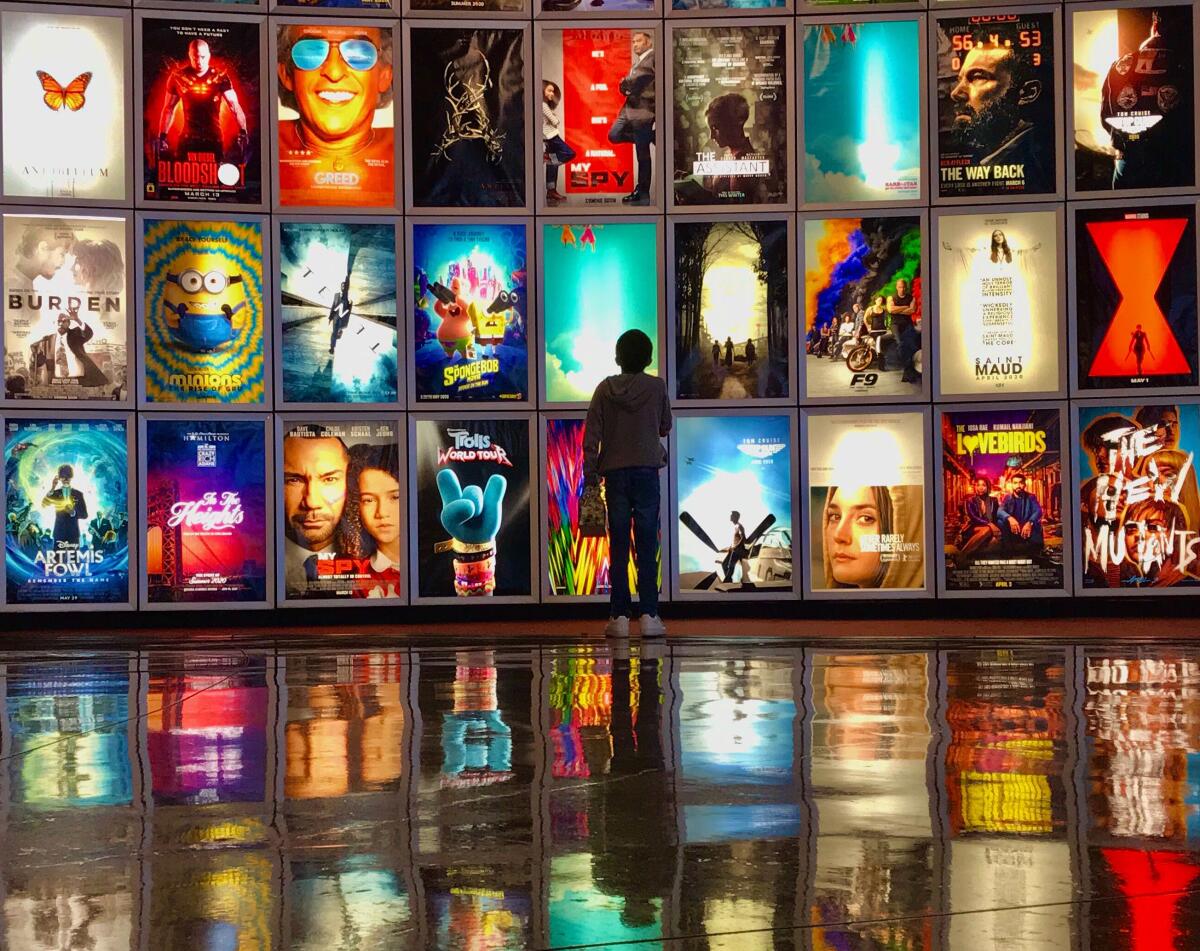Pacific and ArcLight theaters will not reopen after the pandemic, company says

In a stunning blow to moviegoers in Southern California, the owner of Pacific Theatres and ArcLight Cinemas said Monday the popular cinema locations will not reopen as Hollywood struggles to recover from the pandemic.
“After shutting our doors more than a year ago, today we must share the difficult and sad news that Pacific will not be reopening its ArcLight Cinemas and Pacific Theatres locations,” Pacific Theatres said in a statement. “This was not the outcome anyone wanted, but despite a huge effort that exhausted all potential options, the company does not have a viable way forward.”
Inside the business of entertainment
The Wide Shot brings you news, analysis and insights on everything from streaming wars to production — and what it all means for the future.
You may occasionally receive promotional content from the Los Angeles Times.
Los Angeles-based Pacific, whose locations include the ArcLight Hollywood on Sunset Boulevard, is the latest victim of the COVID-19 pandemic, which has buffeted the theatrical exhibition industry.
Theaters in Los Angeles just started to reopen last month in time for the release of Warner Bros.’ “Godzilla vs. Kong.” Although large chains such as AMC reopened swiftly, smaller companies have taken longer to get back on their feet.
Hollywood studios delayed their big blockbusters for months, waiting for more theaters to reopen across the country. The wait created a vicious chicken-and-egg scenario, in which cinemas struggled without big new movies to show and studios didn’t want to shoulder the risk of releasing expensive blockbusters in a hampered market.
The demise of ArcLight and Pacific, owned by L.A.-based Decurion Corp., is among the highest-profile entertainment industry collapses of the pandemic.
Theaters across the country have tried to survive by negotiating deferred rent payments to landlords. Even AMC Theatres, the world’s largest cinema chain, has restructured its debt and gone to Wall Street to raise cash multiple times to stay afloat.
Although it is not clear what ultimately forced Pacific and ArcLight to throw in the towel, the economic pressures have been especially tough on smaller regional chains. Previously, Austin, Texas-based Alamo Drafthouse filed for Chapter 11 bankruptcy protection, as did Dallas-based Studio Movie Grill, but both have said they’re not going out of business.
A spokesperson for Pacific and ArcLight declined to provide further comment.
ArcLight, launched in 2002, had 11 locations — six in the Los Angeles area, including the flagship Hollywood theater and the historic Pacific Cinerama Dome on Sunset Boulevard. It also had theaters in Boston, Chicago, Washington and San Diego. Among its popular destinations was the Santa Monica 12-screen theater that opened in 2015.
It’s unclear whether any of the locations might be revived by another owner.
Arclight and Pacific theaters served as anchors to some of the region’s most upscale shopping centers, including Santa Monica Place in Santa Monica, the Grove in Los Angeles, Americana at Brand in Glendale and Paseo Colorado in Pasadena. Their landlords will be hard pressed to find other types of tenants to fill those empty spaces that would attract as many visitors as theaters do. Cinemas are coveted by shopping center owners because people who go to movies often shop or dine elsewhere in the mall.
Where Pacific and ArcLight theaters are tenants, landlords may scramble to find operators such as AMC Theatres, Regal Cinemas and Cinemark Theatres, which have seen their stocks recover as pandemic restrictions ease. In locations that Decurion owns, including the shopping center with the Cinerama Dome, it’s possible that another operator could become a tenant showing movies in the venerable venue.
Rick Caruso, landlord of the Grove and Americana at Brand, vowed that movies would continue to roll on his properties, even though Pacific owns those theaters within his malls.
The theater business is viable, he said, and “a critical touchpoint” for Los Angeles.
“We believe in the future of this sector, the future of entertainment, and we will not submit to the pressures of this unrelenting year: We will rise up and reimagine the future of moviegoing,” Caruso said in a statement. “We firmly believe in the future of the movie-going experience.”
The ArcLight brand was of particular importance in the film community, which reveres its local cinemas. The Hollywood location hosted special industry screenings and frequently had filmmakers as guests to speak to attendees about their work.
“There’s a reason every movie lover in L.A. is in mourning,” said Rian Johnson, director of “Star Wars: The Last Jedi” and “Knives Out. “If you lived in this town and loved movies, you’ve had life-changing experiences in that complex. But more than that, it’s easy to forget how the ArcLight completely transformed the moviegoing experience: assigned seating, plush comfy chairs, no late entry to screenings, these were all considered wild and crazy ideas when they first opened.... This is a huge, huge loss.”
ArcLight was indeed a pioneer in the trend of movie houses serving wine, beer and cocktails and offering other luxury amenities.
But ArcLight faced increasing competition from bigger companies trying to up the luxury cinema game with reclining seats and in-theater dining. Companies such as Mexico-based chain Cinepolis and AMC opened theaters that offered patrons the option of dining in their auditoriums.
Pacific had six locations, all in California, including theaters in Glendale at the Americana at Brand and at the Grove shopping complex.
Los Angeles, the heart of the entertainment industry, was among the last major metropolitan areas to reopen theaters, making the company particularly vulnerable to the challenges posed by the pandemic.
Los Angeles-based arthouse chain Laemmle, which is family owned, also didn’t reopen until last weekend.
“To all the Pacific and ArcLight employees who have devoted their professional lives to making our theaters the very best places in the world to see movies: We are grateful for your service and your dedication to our customers,” Pacific Theatres said in its statement. “To our guests and members of the film industry who have made going to the movies such a magical experience over the years: our deepest thanks. It has been an honor and a pleasure to serve you.”
Times staff writers Mark Olsen and Roger Vincent contributed to this report.
More to Read
Inside the business of entertainment
The Wide Shot brings you news, analysis and insights on everything from streaming wars to production — and what it all means for the future.
You may occasionally receive promotional content from the Los Angeles Times.











